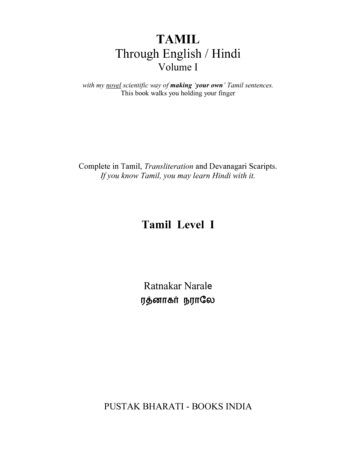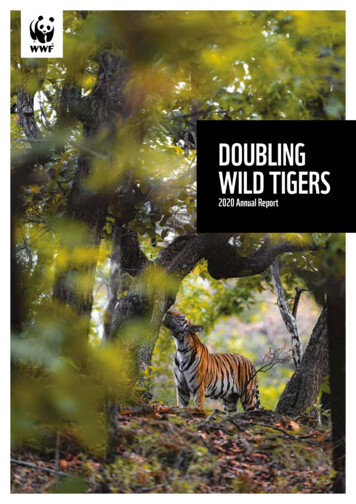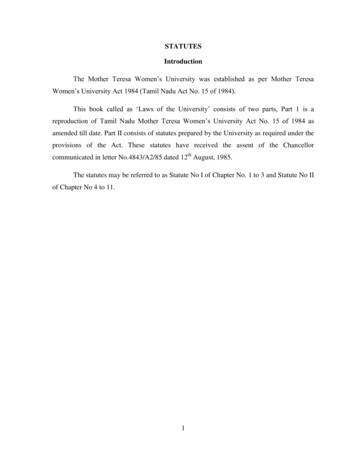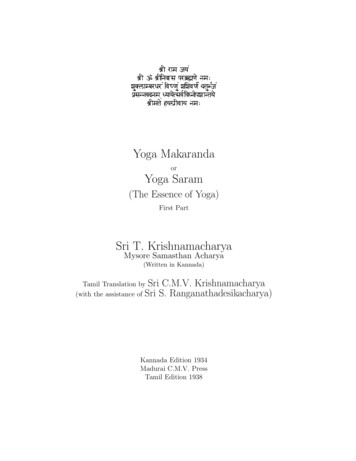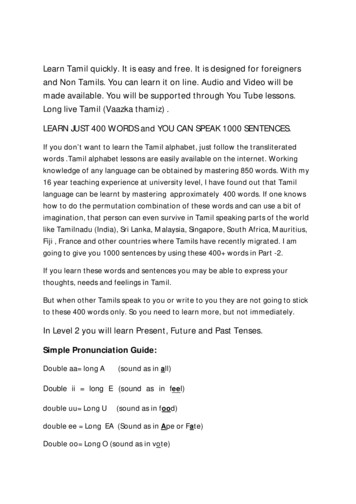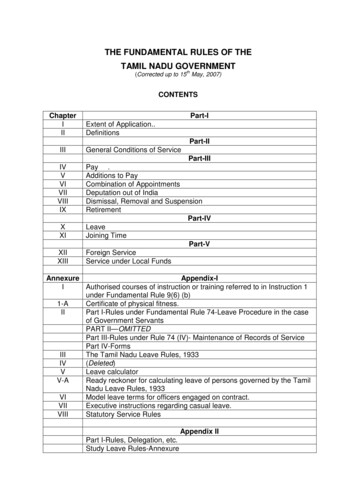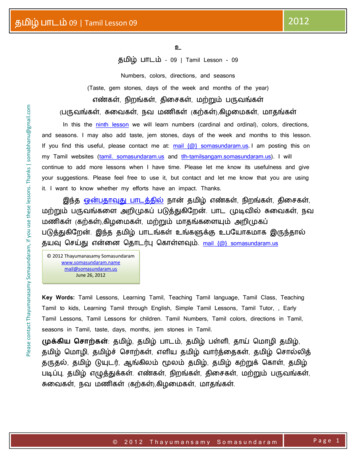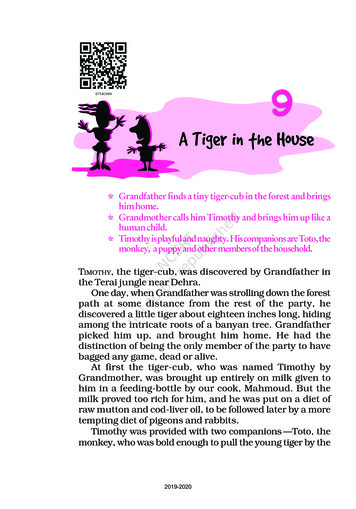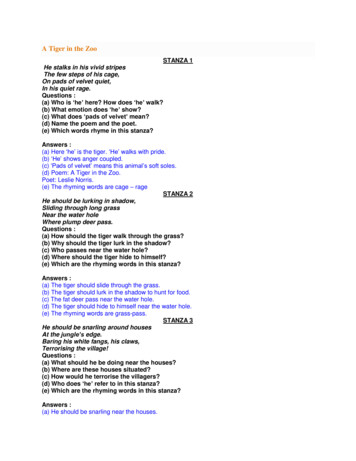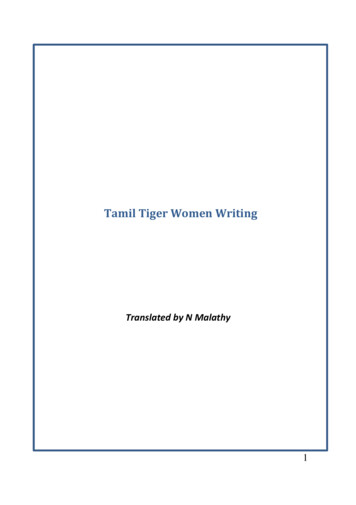
Transcription
Tamil Tiger Women WritingTranslated by N Malathy1
ContentsTamil Tiger Women Writing . 1Introduction . 3I will wait . 7Koolam . 8My pen ! . 9My unwritten poem . 11Oh Freedom . 13Oh the UN . 14Rise up for the new dawn . 16We want beautiful minds . 17The world is yours . 19Whisper in their ears . 21You – Night – Us . 22A cup of tea . 23Channel-4 . 28Fire within . 33How far would you go? . 45My doors are open . 49New stories for our times . 51Paakkiam amma . 59What price . 73Search for the Tiger’s tail. 82Into public space . 88Stats . 94Bibliography. 972
IntroductionWomen have partaken in large numbers in various armedstruggles around the world for about 40-50 years. Invariablywomen have joined these armed struggles a few years after thearmed group had been formed and the struggle had been wagedby the males. Women’s emancipation is often promoted bysuch groups. One reason, of course, is to increase femalerecruits which some emphasise is the main reason. They alsoinsist that whatever women gain during such participation inthe armed struggle is gradually lost once the armed strugglecomes to end, even if it is a successful end. In the case of theTamil Tiger armed movement the end is alleged to begenocide; thus the gains that were made by women is lostforever. That is how most people would perceive this end.Does it have to be lost?The overarching Tamil narrative on the Tamil Tiger women ismilitary focused. Masked by this military focused Tamil Tigernarrative is a narrative on women empowerment. This narrativewas strongest within the Tamil Tiger movement compared towhat existed before and what exists now in the Eelam Tamilsociety. It is also important to acknowledge that it will takeseveral decades, if at all, to achieve what was achieved withrespect to women within the Tamil Tiger run Tamil Eelamdefacto-state which is now destroyed. This alone is a goodreason to draw out from the writings of Tamil Tiger womenthat what is relevant to contemporary times. This is the aim ofthis work.3
A selected writings in the form of poetry and short story thatare inspirational for contemporary women are included here.All the poetry appear first followed by the short stories. Thisselection is deemed to convey five major themes which wheninternalised by women can be inspirational for social justicestruggles. These five themes convey narratives on: 1) the featsof the women and the price they paid; 2) the hurdles theyacknowledge in their struggle; 3) the positive societal outcomesof their struggle; 4) the fire within which took them to thoseheights and above all 5) the call to rise up for social justicestruggles.Kasthoori’s poem “Oh Freedom” and the Malaimahal’s story,“What price” convey the pride in achievements and the pricethey paid. Kasthoori laments the high price paid by EelamTamils and how it has gone so cheap elsewhere. Malaimahalalso underscores the huge price they have paid in the struggle.Three poems, “Oh the UN”, “My pen”, “You-night-us” and thestory “My doors are open” all speak of the different hurdlesEelam Tamil women face. Barathy identifies the UN andcompares it to both a hen trying its best to protect vultures andan ostrich hiding behind catch phrases. Vaanathi in her poem“My pen” challenges those who again use empty words todecry the struggle for social justice. Nila’s poem “You-nightus” takes on male chauvnism, be it very mildly. Malaimahal inher story, “My doors are open” is more forthright inchallenging historical as well as contemporary malechauvnism.The positive achievements of these women are expressedmainly through the short stories they have penned. In the4
stories of Malaimahal as well as the two stories by Ampuli andVettichchelvi one can sense the free and joyful interactions ofwomen on battle fields. Vettichchelvi probably unintentionallyshows how this has permeated the Vanni civlian women evenpost-2009.Ampuli’s “Fire within” attempts to tell the readers the burningdesire of pooraalis to win freedom and also reiterates the hugeprice they are paying for it. Kasthoori’s “Paakiam amma” alsobrings to us the fire that was burning even within civilianwomen like Paakiam.Finally many of the poems is a call to rise up for that freedom.There is a legend popular in the Vanni about a woman namedAriyaaththai who tamed an elephant that all the men failed totame. Ariyaaththai was found dead the day after her feat. Herstory is cited even today as a source for inspiration. Her feat,the price she paid and her name still used to kindle fire within.Even more impressive than Ariyaaththai’s story are theseselected writings of the Tamil Tiger women convey.At the end of this anthology additional translated writings ofTamil Tiger women relating strictly war time emotions are alsoincluded. These include a few more poetry and two more shortstories. Also included are three excerpts from the historydocument, “Viluthaaki Veerumaaki”, about the largestwomen’s military regiment of the Tamil Tigers – MalathiRegiment.5
Three further sections at the end are written by the translator ofthe anthology. The first of these sections describe thehistorical process through which Eelam Tamil women enteredthe public space leading to their participation in the armedstruggle. The second section is statistical data on the EelamTamil women who carried arms. The last section is acomprehensive bibliography of works by Eelam Tamil womenwho either carried arms or who have worked closely withthem.The following Tamil words are used in this text:Maaveerar(s)Pooraali(s)-refers to Tamil Tiger member(s) killed inbattle; means Great Hero.-Refers to living Tamil Tiger member(s),meaning warrior or fighter for justice;6
I will wait by Samarvili (“Kaaththiruppu” in “Velichcham” Pearl Issuemarking 25 years of publication, 2001. Note: Kin in this poemrefers to fellow comrades.)Midnight Vultures surrounded the village.Dozing villagers sacrificed to demon.My eyes blinded in anger.A silent war within me.Have I not been called a terrorist?Do I not have Tamil Eelam blood?I joined the list of the disappeared.My name in hand-cuffTogether with our departed kinI will wait for the freedom .7
Koolamby Ko. Si Kalaikkathir (“Koolam” in “Velicham” Pearl Issuemarking 25 years of publication, 2001. Note: Koolam is thedesign women make every morning on the ground in front oftheir homes with flour)Amma handed the tradition of making koolam.She loved watching amma making koolam.As she got older , when she felt shyShe made koolam with her big toe.When time came for her to make koolamThere were termite mounds in her yard.Her hands picked up the spade andThere are no more termite mounds.Her blood had made koolam in her yard.An enduring koolam that will not be erased.8
My pen !by Vaanathi (“Enathu peenaa” in ”Vaanathiyin Kavithaikal”,LTTE Publication Division, 1992)My pen is sharp like the gun in my hand.My gun spits only bullets.My pen will spit everything.My poems are disallowed in competitionsBut where our feelings are disrespectedMy pen will enter without permission.My poems rejoice not the flatterSince it had received the top adulation.My pen will challenge any expertMy pen has emotions that are alive.An appeal to those pens that deride our feelingsReveal your identity so my pen can rip your mask.My pen is sharp like the gun in my hand,My gun only aims at the enemy butMy pen will aim at everything.My pen’s thoughts of pastAre the events of the present.My pen’s thoughts of presentAre the events of the future.9
Do you not understand?Do you not understand my poetry?This is not a victory for meThis is not a victory for my poemThese are victories of my pen.My hands may rest or be destroyedMy pen will never rest just like our guns.My pen is sharper than the guns in my hand.10
My unwritten poem by Vaanathi (“Eluthaatha en kavithai” in “VaanathiyinKavithaikal”, LTTE Publication Division, 1992)(This was Vaanathi’s last poem written just before she waskilled in the attack on the Elephant Pass on 15th July 1991.)Write my unwritten poemThat is my plea to you.So many thoughts But I cannot come sinceMy gun is at the boarderSo write my unwritten poemThat is my plea to you.Behind my fuming gunMy body may be crushedMy emotions will remainMaking you reflect, thenWrite my unwritten poemThat is my plea to you.Memorials may rise in our nameIn our liberated land,Not for you to cry overNor for flowers and incense.It is to strengthen your resolve.11
So Write my unwritten poemThat is my plea to you.In my purposeful deathIn the Tamil Eelam that risesYou will roam for certain.Then My unwritten poemWill stand before you.Those Who knew meWho understood meWho embraced meWho loved meLook within my unwritten poem.There You will find all the maaveerarSmiling at you.12
Oh Freedom by Kasthoori (“Suthanthiramee” in “KasthooriyinAakkangkal”, LTTE Publication Division, 1992)We wanted to walkHolding your handsEver present deathHas become cheapYour price keeps going upElsewhere you go cheapWe paid by heaps – butWe only get bulletsTo the bullets we sayYou cannot swallow freedomYou cannot put out that fire – soLeave the brave soulsAnd surrender to theEnemies of humanity13
Oh the UN by Barathy (“Ainaa sapaiyee” in “Kaathoodu Sollividu”,Publication Section – LTTE Women’s Division, 1993)The tall buildings of UNStands strong and highOn the strength of human bonesIts colourful flags flutter – likeCountless lives it swallowedYou talk betterment of lifeBut look down under the red carpetHuman bodies wriggle like wormsPortends your blinded eyes to openHen protects its youngBut you protect the vulturesBloated with lives of the poorThe vultures belly peaks outUnable to hide under your wingsLike an ostrich hiding its headYou hide behind ” world peace”Your face is not visibleBut your body is so naked.You claim the right to declareThe rights of all humansOur people, our rights, we declare14
When our strength grows – withOur skill and dedicationYou will come to set things “right”We will then teach youOur experience of freedom15
Rise up for the new dawnby Barathy (“Vidivitkaai eluvoom” in “Kaathoodu Sollividu”,Publication Section – LTTE Women’s Division, 1993)Early dawn awaits round the cornerBird songs welcome the new dawnTrees come alive shaking off dewDry bushes too look afreshSound of explosions nearbyBombs eager to embrace us.Comrade next to me – her handThat held the gun falls stillHer blood paints new picture on the soilThe young daughter’s lifeless bodyFills our fiery eyes with tearsHer gun now blasts in another handOur pace goes upThe explosions still heard afar.The land is silentGrieving for her young daughterCrushed trees, wingless birdsAnd the burning bushesStand up straight with their injuriesTheir marks of freedom struggle.On the soil muddied by bloodOur feet speed towards the goalMemory filled eyes awaitThe next dawn.16
We want beautiful mindsby Ampuli (“Alagiya manakal vendum” in “Erimalai” issue ofJune 2004)We want minds more than peopleBecause we know the power of minds.What cannot be achievedBy training or numeric strengthThe power of the mind has.In our time we have seen many,Whom we thought wouldShrink away limbless and armless,Spread their wings with power of mind.Therefore, we want such beautiful minds.More than a luscious green gardenMore than the stream that runs throughMore than the rainbow in the skyMore than a beautiful faceWe want those beautiful minds.To nurture empathyTo sculptor the nationTo strip the falsityTo bury the differencesWe want beautiful minds.17
Drilled by bombsShattered to piecesOvergrown with weedsBurnt into empty spacesFilled with headless treesTo beautify this homelandWe want such beautiful minds.18
The world is yours by Thamilaval (“Vaiyakam Vasappadum ” in “Velichcham”Issue marking 25 years of publication, 2001)Living stretches, empty and longKitchen smoke, taste of foodAnd the man’s welfare - theseDetermines or is it cursed as living.The competence to send rootsTo seek water in the rocks is wastedAs sandy surface roots ofSkyward looking colourful plantsWoman;All that competence to achieveWhy this tragedy? whose deception?Asphyxiating masks ofDaughter, wife and mother,The longings to throw the masksSupressed into the unconscious.Enough is enough - these staged façadeIt is not wrong for woman to be woman.Be not satisfied with the breezeThat comes through the window.Learn the feat of breaking the lock.Open the door and possess all.19
Thinking freely and loving freedomThese are not crimes to fear.Think yourself, love yourself.The world should be yours.20
Whisper in their earsby Barathy (“Kaathoodu sollividu” in “KaathooduSollividu”, Publication Section – LTTE Women’s Division,1993. Note: This poem is about the black tigers of themovement)Another explosionTore away from gravitySliced through the cosmosLight waves ahead of sound wavesElucidate that brightness to the stars.In the heat of their last breadthOf those unique soulsDestroying the destructive shipThe ocean heaved once more.Keep looking sons and daughtersThe footprints of freedom sculptorsThe true allies of humanityYou will find them here.Let the interpreters on this globeInterpret their heart.Let the researchers on this globeResearch their dedication.Oh, the waves that kissed them lastWhen you touch the shoresWhisper in the ears of our peopleWhen freedom is won they will be back.21
You – Night – Usby Nila (“Neenkalum Iravum Naankalum” in “SuthanthiraParavaikal” Issue, Oct-Nov 2002)Your hands would stretch to stop us speeding.“Can we come too brother?” you would say.We would speed without words.If we had forgotten to dim the lightsYou would scold in the gendered tone.A sad smile would come over us.Oh brothers, we are your sisters.We fired artilleries non-stopFrom stationary launchers.Then we drove moving launchersChasing the escaping enemies.How then do you decide thatAll who drive at night are males?Throw away your foolish assumptionsAnd observe the coming changes.Tomorrow your big sister may drive a Hiace van.Your little sister may pilot a plane.Your niece may become the naval commander.Your daughter may drive the heavy vehiclesTo renovate the Tamil Eelam roads.Hope you would live to see your granddaughterRoll along this struggling world with one hand.22
A cup of teaby Malaimahal(“Oru kooppai theeniir” in “Velichcham” issue of Dec 1999,republished in “Malaimahal Kathaikal”, Capt VaanathiPublishers-LTTE Women’s Division. Note: Pittu is acarbohydrate food made of flour.)Pittu and curry for breakfast, rice and curry for lunch, pittu andcurry for dinner. That is ok. Then pittu and curry for breakfast,rice and curry for lunch and dinner. That is also not too bad. Afew days later, rice and curry for all three meals. That too, riceand eggplant curry for breakfast, eggplant curry and rice forlunch, and rice and eggplant curry for dinner. The dinner andlunch meals delivered together. A few more days later, ricewater for breakfast, eggplant curry and rice for lunch anddinner.Cursing those who grew eggplant we swallowed our food. Ourtaste buds were given compulsory rest. Having reached adetached state with respect to food, we were gratified with onecup of tea. Our attention was focused on the military in front.“It is because of you we are in this situation. Wait a while. Wewill also return to our old state because of you.”, we groaned toourselves. Anger swelling within we immersed in our duties.Because of our friendship with eggplant curry, the food parcelshung on the tree branches above us. If we look up, it brings23
anger and sadness. Sadness because we could not bringourselves to throw the food while our people were starvingwithout even one meal a day. We did not have the heart to buryall that food. Our stomachs could not let go of it either.While looking up at the food parcel a bright idea occurred. Is itnot how Isaac Newton also had a bright idea. He looked at thefalling apple and discovered gravity. We are like that too.Once a bright idea is hatched, the next step is to put it intoaction. We took the cleanest of the bags that were given to usto strengthen our security posts as sandbags. We washed thebag clean and spread it under the sun. We spread the cookedrice on it and allowed it to dry. We roasted this in the pot weuse to make tea and crushed it into finer bits in the same pot.We did the same to the pittu that arrived on rare occasions.If we put a handful of it in the mouth. The crunchy rice tasteddelicious. The evening snack is now ready. What eveningsnack? Whenever we felt hungry a handful of this and a cup oftea will fill our stomachs.We did not waste even a single grain of the cooked rice. Theplan to convert left over rice into snack was implementedacross all our security posts at the frontline. With the energyobtained from a plate of this rice powder and a cup tea, one candig a one and a half feet trench in one hour. It does not matterif those in Colombo embargoed food coming to us. We hadcreated the situation where we will not be affected by theseembargoes.24
As the food shortages worsened outside, the sugar ration wasreduced. We could not have tea with sugar. We started lickingthe sugar while we drank the tea, when this was also difficultwe mixed the rice powder with sugar and licked that while wedrank tea. The rice powder which started as an accompanimentfor tea became one of its raw material.During different seasons of forest fruits, we made fruit syrupswith these fruits and drank our favourite tea with this. With thehighs we got with the cups of tea and the strength we got fromrice water and eggplant curry we focused on our duties.The people of the civilian based border unit that took oversome of the security posts nearby were shocked to see the typeof food we were living on.“Children! is this the food you eat and fight like this?”, theywere aghast. They shared with us the toffees they had broughtwith them to eat in between meals. We thanked them and putthe toffees in our pant pockets. We did this once or twice. Theymust have been intrigued by our action. They could not resistasking.“Why are you putting it in the pocket. Eat it now. We will givemore to take it to your people.” We could not stop laughing.“We drink our tea with this because we do not have any sugar”,we told them.25
“How can you drink a cup of tea with four or five tiny toffees.How many toffees do you need to drink a cup of tea?” theyasked.They were dumbfounded by our reply, “We can drink tea fouror five times with one toffee”.The thought of the many girls out of their sights, facinghardships and fighting at the frontline, like these girls here,must have moved them. They handed over to us all the sweets,snacks and biscuits they had brought with them and said withtears in their eyes,“We are here just for a week. When we get back home we caneat. You must eat these things”.For a few days it was lucky stars for us. With different varietiesof snacks our tea time was like a festival.Implementing our leader’s plans our teams kept movingforward, Oddusuddan, Nedunkerni, Karippaddamurippu,Olumadu, Mankulam, Kanakarayankulam All along wherethe enemy had vacated, there were what he had left behind:footwear, raincoats, belts, cheese tins, packaged date cakes,burnt curries on the stoves, plates on the table served with highquality food items, fridge stacked with green vegetables,skinned chickens, pricy liquor, fizzy drinks .We followed chasing the enemy. We drank the fizzy drinks andwashed our face with it. We took a mouthful of the food on the26
plates, we ran behind the enemy not having the time to washour hands.The rice water drinking Tigers chased. The lions fed on cheeseand meat ran – drove away in their vehicles leaving everythingbehind all the way back to Omanthai.27
Channel-4by Vettichchielvi (“Chanal 4” in “Kaanaamal PoonavaninManaivi” short story collection, Chozhan Padaippagam, 2012,India )Muhuntha had no inclination to watch the Channel-4documentary. Are there going to be anything in it that she doesnot know already, that she has not seen or that she has notheard about. Though three years had passed after claiming thatthe war is over, the scenes of death she had seen have stayedon. They are permanently registered in the brain to torment thesouls forever, even after death. She wanted to forget. At leastfor a few days she would like to experience a restfulness. Thatis what she wants but can she?Nimalan’s voice sounds agitated and demanding on the phone,“I know you don’t like to watch these things, Muhuntha. Butplease see it once. Our Aruna’s brother is there. Please watch itonce for Aruna’s sake.”Aruna, their friend, is one of five children to her parents.Maran is her only brother and he had joined the movement. Hewas among those considered “disappeared” at the end of thewar. Has he now “displaced” with those who are “dead”. WillMaran’s family bear this truth? No it won’t. That familysurvives by praying daily for his existence if not for his returnto the family. They have faith that he is alive somewhere. It issuch faith that helps these families deal with grief.28
Muhuntha gave up her stubborn refusal to watch the Channel-4documentary. She put her shoulder bag on and ran to thenearby internet shop. She tapped on the keyboard and theChannel-4 scenes played before her eyes. The same smell ofblood pierced her nose. Pain pricked her heart like a thousandthorns. The scenes she resisted to even think about waspresenting itself in front of her eyes. She put her head in herhands and began searching for Maran.There Maran! Yes, it is Maran. Brother of her dearest friendAruna. The video scenes were announcing that Maran was notonly dead but also how he was killed.Muhuntha quickly closed the page showing the video. She feltdizzy. She sat down again and put her head in her hands. Herheart ran to Aruna. It cried with Aruna on Aruna’s shoulders. Itconsoled Aruna’s mother. Her heart made everyone in thatfamily’s village to come to the family’s home to cry for Maran.It made the family serve a meal to the village to end thegrieving period. Her heart told Maran’s mother theconfirmation of his death and pleaded with her to stop thesearch.Muhuntha got up, paid at the counter and came out.She called Nimalan, “It is Maran.”“See I told you. He looks just like Aruna. That is how Iguessed. Muhuntha, how are you going to tell this to Aruna?”29
“I have to tell her. I am going to their place straightaway. I willtalk to you later.”“Ok. If I could, I would come too.” Nimalan who was made aquadriplegic in the war shows concern for everyone else as ifhe has channeled all the lost feelings in his body to his heart.“Yes, I know. Talk to you later”, said MuhunthaMuhuntha came home, stuffed a change of clothes in her bag.“I am going to Maran’s house. I will come back onlytomorrow”, she told her cousin. There was no response fromher cousin. Muhuntha knows that her cousin will be grumbling,but she was in no mood to be concerned about it. Muhuntha,having lost all her family in the war has sought shelter with hercousin.Muhuntha hurried to the road and caught the bus toKilinochchi. Perspiration on her forehead was running downthe side of her face. She wiped it off with the back of her handsand tried to keep calm.After traveling for a few hours she got off at the Kilinochchibus stand. She caught a three-wheeler and arrived at Maran’shouse. People there were delighted to see her and the welcomewas warm.“Why didn’t you call before coming”, scolded Aruna holdingMuhuntha’s hand. She playfully punched Muhuntha’s shoulder30
with her other fist. Muhuntha gave a shout that broughtAruna’s mother from the kitchen.“Welcome child. How come you have come withoutinforming” said Aruna’s mother giving Muhuntha a kiss.“I felt like it so I came. Should I not come withoutinforming?”, Muhuntha tried to smile, controlling her tears.“What is the matter? Did you have a fight with your cousin?”Aruna’s query made Muhuntha angry.“Will you be quiet” said irritated Muhuntha.Aruna’s mother also joined in querying Muhuntha’s situation.Muhuntha controlled herself.“No, no nothing. The traveling had given me a headache” saidMuhuntha putting her hand on her forehead.She could not bring herself to tell them that she came to informthem of Maran’s death. She could not imagine the tears andcries that will pervade this family which now appears to be in astate of settled calm,“Get up. Go and wash your face first”, ordered Aruna. ThenAruna told her mother to make a hot cup of tea for Muhuntha.Muhuntha held Aruna’s hand tight.31
“What is it Muhuntha?”, queried her concerned friend. Yet,there was a happy smile on her face. The days when she criedendlessly for her disappeared brother had passed. She has justregained that smile on her face. Should this smile be wiped outagain?“Just not feeling right?” said Muhuntha, trying to smile.“Give away five of those heavy burdens you are carrying, giveone to me and just keep one” joked Aruna and laugheduncontrollably.Muhuntha just could not think of bringing sorrow back into herfriend’s face. She played along. Throwing her arms open shedemanded “Carry me to the well”. That was her attempt to hideher state of mind.Aruna picked up her friend like a bundle and carried her to thewell. Aruna’s two sisters who were sitting under a tree near thewell burst out laughing seeing the antics of the two grown upfriends.Why should Muhuntha dampen this laughter, yet again?32
Fire withinby Ampuli (“Ullee eriyum thee” in “Vali” short storycollection, Capt Vaanathi Publication – LTTE Women’sDivision, 2005)Translator’s noteIn late 1995, Lankan military launched the operation whichwas code named “Sun rays” (Riveresa in Sinhala andSooriyakathir in Tamil) to recapture Jaffna peninsula whichwas mostly under the Tigers control at that time. The battlesmentioned in this short story indirectly describes how theTigers gradually lost the south-west parts of the Jaffnapeninsula. The Tigers eventually withdrew completely fromJaffna peninsula. This short story is set during these battles.The story shows that the author has had first hand knowledgeof these battles.For those readers who may have difficulties distinguishing themale and female names, all the names in this story are femalenames except the following, Kannan, Ranjan, and Hari. Someof the Colonel level male military leaders who are mentionedhere are Banu annai and Balraj annai – annai being the termfor older brother and also used as a term of endearment.Similarly the Colonel level female military leader Vithushamentioned here is post fixed with acca meaning older sisterand also used as a term of endearment.***33
Artillery shells were coming non stop. The military hadstationed all sizes of cannons and were firing towards theTigers side.Neela was carefully listening to recognize the noise of the shellleaving the firing barrel. For each such firing sound shelowered her head into the trench. The shells fell all aroundthem, in front of her, past her, and on her side. The explodingshells dug into the Urumpiraai red soil and threw red mud allaround. The trench was muddy after the rain and her team hadspread the large banana leaves on top of the mud and weresitting on it. Her team, the “carrier team”, was observing thesituation. The carrier teams are responsible for, carrying awaythe injured and the dead, distributing food to the frontlinepooraalis and carrying ammunition to the frontline.“Keep your heads down in the trench” said their leader,Sobana, and she ran around making sure everyone was safe andthen lowered herself in one trench. She awaited for a messageon her walkie.Neela, Kalai and ten others had been just sent to the spot toreplace the losses in the defensive battle to stop the militaryadvancing towards Urumpirai. Because they had been withother frontline battle teams for some time they had been nowplaced with a carrier team.Within three days of their arrival the battle had intensified andthus the non-stop artillery shells.34
“You there, lower your head ”, Neela scolded Kalai just in timeas a shell landed very close to them.“Lucky that it did not explode. Or else it is either you or me”.Kalai laughed as Sobana’s walkie came alive.“Send two
The overarching Tamil narrative on the Tamil Tiger women is military focused. Masked by this military focused Tamil Tiger narrative is a narrative on women empowerment. This narrative was strongest within the Tamil Tiger movement compared to what existed before and wha
